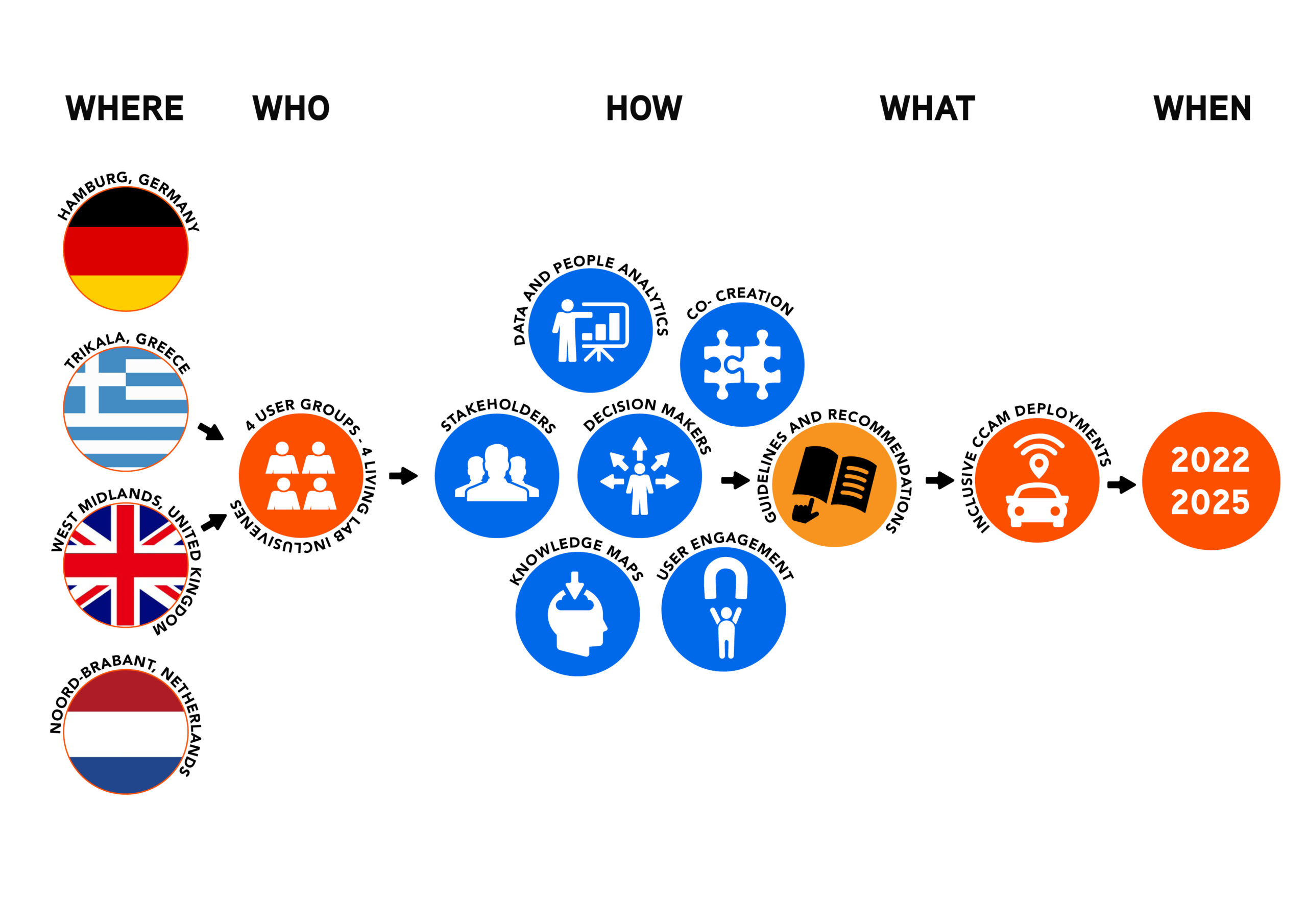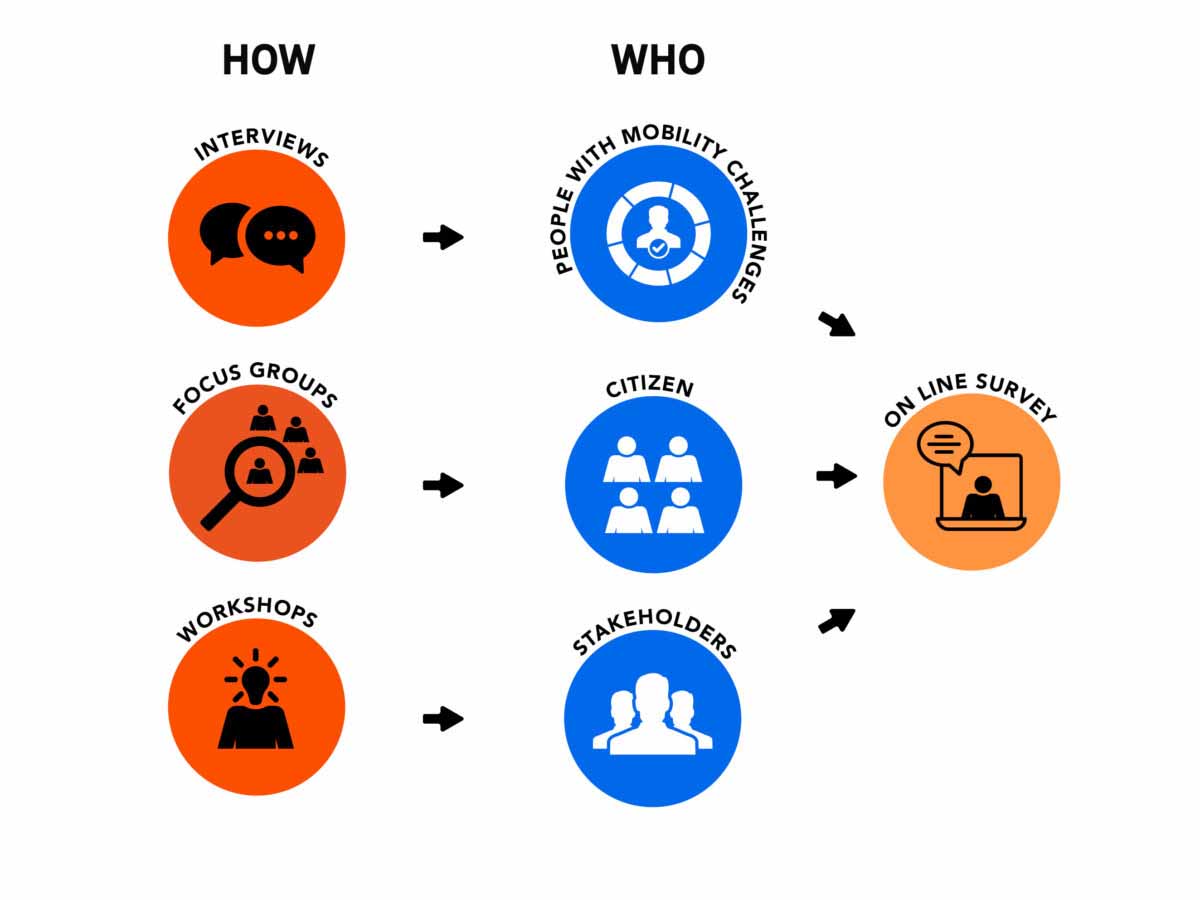About
The acceptance of Cooperative, Connected and Automated Mobility (CCAM) solutions by citizens and future users is an element of strong interest for all stakeholders involved in the autonomous and connected vehicle sector as well as other (non-vehicle) connected services.
SINFONICA is developing efficient and innovative strategies to:
All the above has the overall objective of fostering inclusive CCAM deployments, based on user needs.
The Overall SINFONICA Concept
The Project follows an overall bottom-up approach to capture the mobility needs of European citizens, with special attention to the needs of vulnerable users and under-researched groups. Different segments of society will be represented and directly engaged in a participative process. This will contribute to the development of a wide inventory of knowledge organized in the form of knowledge maps.
Finally, SINFONICA will create an innovative tool – the Knowledge Map Explorer – able to exploit the knowledge by providing practical guidelines and long-term recommendations to ensure that CCAM solutions meet social inclusion criteria.

Engagement Activities
User engagement activities will be the core of the project. It is important to give voice to all individuals involved in the CCAM sector, and for this reason we have developed a dedicated engagement strategy for data collection to compose a comprehensive and exhaustive Knowledge Map. Data collection will take place in the territories of the Groups of Interest and will be qualitative and quantitative, consisting of various engagement activities. A careful analysis based on the review of existing literature on CCAM led to the selection of different categories of users and stakeholders to be involved. The three categories of people with mobility challenges, citizens and stakeholders will be consulted through interviews, focus groups and workshops, respectively. Data collection will be iterative in nature and will take place in 3 consecutive rounds. In addition, an online survey involving 500 individuals will also be conducted. The insights and information gathered will be inferred in the interactive tool named Knowledge Map Explorer.
Activities
User engagement activities will be the core of the project. It is important to give voice to all individuals involved in the CCAM sector, and for this reason we have developed a dedicated engagement strategy for data collection to compose a comprehensive and exhaustive Knowledge Map. Data collection will take place in the territories of the Groups of Interest and will be qualitative and quantitative, consisting of various engagement activities. A careful analysis based on the review of existing literature on CCAM led to the selection of different categories of users and stakeholders to be involved. The three categories of people with mobility challenges, citizens and stakeholders will be consulted through interviews, focus groups and workshops, respectively. Data collection will be iterative in nature and will take place in 3 consecutive rounds. In addition, an online survey involving 500 individuals will also be conducted. The insights and information gathered will be inferred in the interactive tool named Knowledge Map Explorer.
Knowledge
SO1 – Strategic Objective
Create a strong knowledge base, mapping user needs and requirements, especially for people with mobility challenges, for an inclusive CCAM transport system.
Development
SO2 – Strategic Objective
Enable stakeholders to take informed decisions for social inclusive CCAM transport systems depending on their specific context.
Engagement
SO3 – Strategic Objective
Define a participatory framework to involve and engage citizens and relevant stakeholders in the design and creation of inclusive CCAM transport system.
Implementation
SO4 – Strategic Objective
Provide recommendations and guidelines for social innovative, citizen-oriented CCAM long term planning and large scale demonstrations in cities and regions.
The Knowledge map explorer
Data and information collected – together with the methodologies and strategies defined in SINFONICA – will be rephrased through the creation of technical knowledge maps. Starting from these knowledge maps, the Consortium will develop the Knowledge Map Explorer: an interactive tool to deliver tailored information, based on the profile of the user consulting it (industries actors, road operators, public administrations, researchers, academia, and stakeholders interested to the CCAM domain and its societal aspects). The Knowledge Map Explorer will be an intelligent user-friendly navigation system: depending on the type of user doing the research, the system will offer what is most appropriate for its specific need. The tool will propose guidelines and recommendation for the implementation of CCAM solutions, specifically indicated to be truly inclusive, equitable, efficient, and accessible according to each specific context.
Groups of Interest
The SINFONICA Groups of Interest (GoIs) are Living Labs where the project activities will be implemented to enact the developed methodology and co-creation processes with the stakeholders.
The specific working groups emerged around four territories: the cities of Trikala and Hamburg, the province of Noord-Brabant, and the metropolitan area of West Midlands. Each of these GoIs will be composed of representatives of public administrations, associations of vulnerable users, citizens and various stakeholders. The GoIs will be created according to methodologies that will allow to properly include the representative of all the identified categories. It is important to underline that all the activities happening in the GoI will be guided by an evaluation process that will allow understanding the correctness of the scientific research. The territories have been selected in order to guarantee different perspectives and points of view at the geographical level, at the level of digital advancement, at the level of experience and interactions with the CCAMs.





